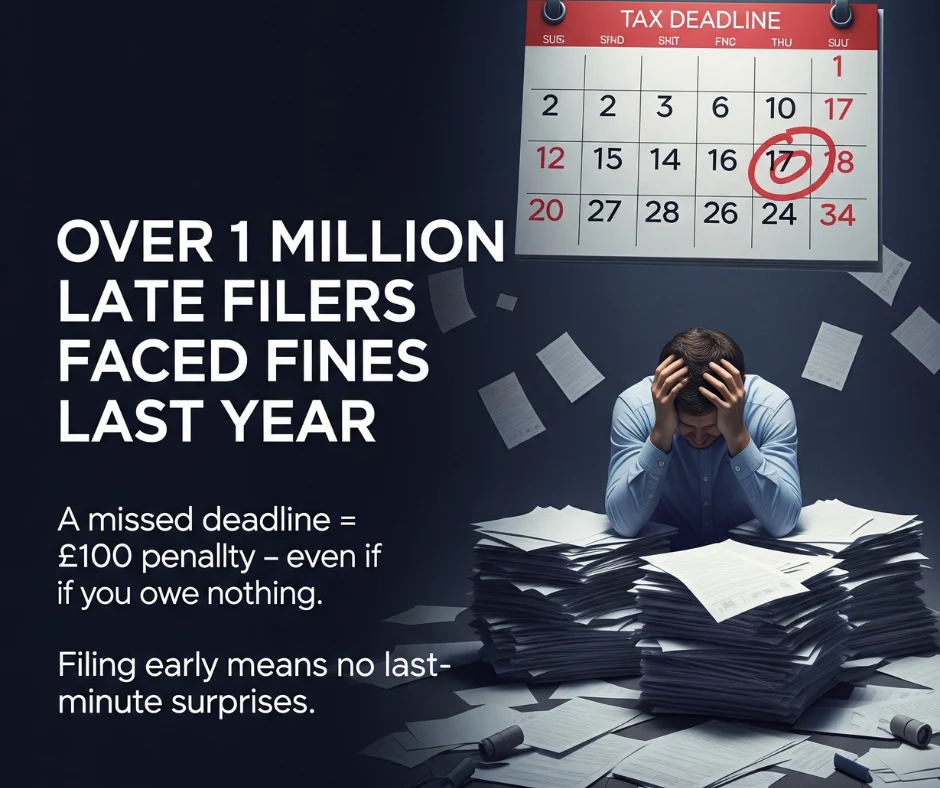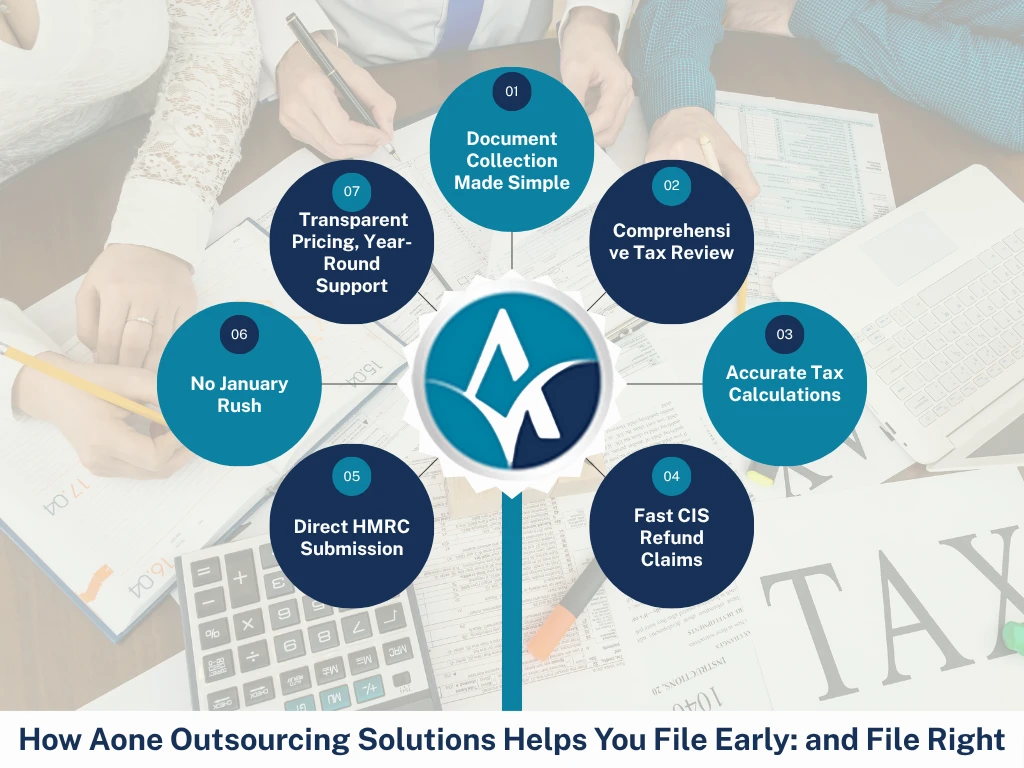
GET A FREE CONSULTATION TODAY!
Fill in the details, and our experts will contact you.
Every year, as the 31 January deadline creeps closer, millions of UK taxpayers rush to complete their self-assessment tax return. The last-minute panic is real, scrambling for receipts, chasing missing paperwork, resetting HMRC passwords, and trying to remember if that freelance project was this self-assessment tax year or the last. Filing your self-assessment tax form wasn’t a last-minute burden, but a good plan.
Here’s the truth: Filing your self-assessment tax early isn’t just about beating the deadline. It’s about taking control of your finances, avoiding costly mistakes, and giving yourself time to plan for tax payments, to fix errors, to claim refunds faster, and to access professional advice before everyone else is fully booked. Yet, despite these benefits, many individuals and small business owners still leave it to the final weeks or even days.
The result? Overloaded HMRC systems, delayed refunds, rushed calculations, missed deductions, and sometimes hefty penalties for late filing or underpayment. And all of this stress is entirely avoidable.
Whether you're a freelancer, landlord, director, or someone with untaxed income, submitting your tax return self-assessment UK early can save you more than just a fine, it can save you time, money, and your peace of mind. In this blog, we’ll explore the clear advantages of early filing versus the risks of waiting until the last minute and why acting now could be one of the smartest financial moves you make all year.
The Self Assessment tax system is how HMRC collects income tax from individuals whose earnings aren't fully taxed at source. This includes self-employed individuals, landlords, company directors, gig workers, high earners with multiple income streams, and those receiving dividends or foreign income. If your income isn’t handled through PAYE, then you must calculate your own tax and submit your income details using the HMRC Self Assessment UK system.
You’re responsible for filling out a Self Assessment tax form, declaring all relevant income and allowable expenses, and submitting it by the HMRC deadline. Filing your tax return Self Assessment UK allows HMRC to determine how much tax and National Insurance you owe or, in some cases, how much refund you’re due.
The Self Assessment tax year runs from 6 April to 5 April each year. Income earned between 6 April 2024 and 5 April 2025 falls under the 2024–25 tax year. Important self assessment deadlines:
5 October 2025: This is the deadline to register for the first time filing Self Assessment tax return
31 October 2025: Self assessment deadline for paper tax returns

Choosing when to file your tax return Self Assessment UK impacts more than just your calendar, it affects everything from your financial planning to your mental wellbeing.
Despite HMRC opening its digital gateway for online filing as early as April, many taxpayers wait until mid-January to even begin preparing their return. The reasons vary, some underestimate the work involved, while others wait for missing paperwork or struggle with disorganised finances. Others simply dread the task and procrastinate.
But filing late or at the last minute creates more problems than it solves. You face rushed decisions, long wait times for professional help, and the constant worry of missing the deadline altogether.
A minor delay, such as waiting for a bank statement or UTR number, could put you in penalty territory. Even if you manage to file just in time, doing so under pressure increases the likelihood of errors, omissions, and missed deductions.
HMRC has a strict penalty system for late returns. If you submit your Self Assessment tax return UK after 31 January, you’re automatically charged a £100 fine, even if you owe no tax. That’s just the beginning:
After 3 months: £10/day (up to £900)
After 6 months: An additional £300 or 5% of the tax due (whichever is greater)
Interest on unpaid tax starts immediately
Missing the deadline by several months can cost you over £1,000 in fines alone and these charges are applied automatically.
Last-minute filing don’t have time to double-check income figures, locate receipts, or properly calculate allowable expenses. Mistakes can result in paying more tax than necessary or triggering HMRC compliance checks and delays. With automated systems now cross-checking third-party data (like bank statements, payment apps, and employment records), inaccurate entries can quickly flag your return for review.
If you're due a refund for example, CIS workers who’ve had tax deducted at source or those who overpaid via PAYE filing in January means you’ll be at the back of the queue. HMRC receives millions of returns in the last two weeks of January, which slows down processing. That means waiting weeks (or months) to get your money back.
When you file early, you’re not just ticking a box, you’re gaining clarity over your finances. You know how much you owe months in advance, which gives you more time to plan, save, and make adjustments to your spending. You can avoid the January panic and manage your cash flow in a much more strategic way.
For instance, if you file in May and discover a £3,000 bill due by 31 January, that gives you over six months to prepare. If you wait until mid-January to file, you’ll have just two weeks to come up with that same amount a situation that leads many to borrow, dip into savings, or delay payments (incurring interest and penalties).
Tax professionals are far more available from April to November. During this time, accountants have the capacity to give you personalised advice, explore expense categories, and even help reduce your tax liability. By December and January, they’re typically overwhelmed and may not accept new clients, or they may charge higher fees for urgent work. Filing early opens up the best of their time and expertise, which can pay off handsomely.
If HMRC owes you a refund, filing early means you’ll receive it much faster — often within 1–2 weeks. In contrast, filing in January means waiting longer due to volume. That cash could help cover holiday expenses, reinvest in your business, or simply boost your savings.
Everyone makes errors, but early filers have time to amend their return. If you file in July and you forgot a client invoice or expense receipt, you still can make adjustments. Last-minute filers don’t have that luxury, and rushed corrections.
To file your return successfully, make sure you gather:
Unique Taxpayer Reference (UTR)
National Insurance Number
Records of self-employed income, PAYE earnings, pensions, dividends, and foreign income
Invoices, receipts, and mileage logs for allowable expenses
Pension contributions, student loan statements, and gift aid donations
Bank statements, dividend vouchers, P60/P45 if employed
If you're registering for the first time, you must sign up for HMRC Self Assessment UK by 5 October. Once registered, you’ll receive your UTR and activation code by post, and this can take up to 10 working days.

Filing your Self Assessment tax return UK doesn’t have to be a last-minute scramble. At Aone Outsourcing Solutions, we’ve made it our mission to take the pressure off UK taxpayers, whether you're a sole trader, landlord, CIS subcontractor, director, or digital nomad with foreign income. Our streamlined process is built around early filing, so you never face tax deadlines with dread.
We work reaching out well before the 31 January deadline to make you ready and organised. We help you by gathering documents to chasing missing income records, we manage the process so that your return is accurate and submitted early.
Here’s how we help:
We’ll give you a clear checklist of what you need: no jargon, no fuss. Whether you prefer to upload digital records, share cloud access, or work with spreadsheets and receipts, we adapt to your system, not the other way around.
Our experts analyse all your income streams — including self-employed work, rental income, dividends, and PAYE overlaps — ensuring every detail is accounted for. We also identify all allowable expenses, deductions, and reliefs to help legally reduce your tax bill.
We calculate your Self Assessment tax liability well before the payment deadline. That gives you time to plan your finances and avoid cash flow shocks. We also advise if payments on account apply — often overlooked by new filers.
Are you a CIS subcontractor? We help you reclaim overpaid tax as quickly as possible. Many of our clients see refunds in their account within 10–14 days when filing early, often in time to cover summer expenses or December bills.
Once reviewed and approved by you, we handle the online submission via the HMRC Self Assessment UK portal, accurately and securely. You’ll receive confirmation and digital records for your files.
Because we encourage early filing, our team isn’t overloaded in December or January. That means you get the same high-quality service year-round, without delays or last-minute stress. We also send reminders, progress updates, and early filing nudges — so you stay ahead without having to chase us.
We believe in fair pricing, no “January premium” fees here. Whether you need help once a year or want ongoing bookkeeping and compliance support, we’re your long-term partner in UK tax.
With Aone Outsourcing Solutions, your Self Assessment isn’t just filed it’s optimised, stress-free, and done early. You’ll enjoy faster refunds and financial clarity when it matters most.
Filing your Self Assessment tax return UK isn’t just a legal obligation it’s a financial decision that can shape your entire year. Leaving it until the last minute often brings avoidable stress, rushed mistakes, higher accountant fees, and even HMRC penalties. On the other hand, filing early gives you breathing room, better cash flow visibility, faster access to refunds, and professional support when you actually need it.
Whether you're managing multiple income streams, working under the CIS scheme, renting out property, or juggling a side hustle, the sooner you complete your HMRC Self Assessment UK, the better your outcome.
At Aone Outsourcing Solutions, we make early filing easy. Our expert team make sure that your self-assessment tax form is accurate, your income and expenses are well documented, and your submission is timely, so you’re never caught in the January chaos. Filing early isn’t just smart; it’s simple, with the right partner.
The following year's Self Assessment tax year begins on April 6 and ends on April 5. For instance, the tax year 2024–2025 begins on April 6, 2024, and ends on April 5, 2025.
The deadline for online submissions for the 2024–2025 tax year is January 31, 2026. The deadline for paper returns is October 31, 2025.
3. What occurs if I fail to submit the Self-Assessment before the deadline?
Even if there is no tax due, a £100 penalty will be automatically applied if your return is submitted after the deadline. Interest on late payments, additional fees, and daily penalties result from persistent delays. These hazards are eliminated by filing early.. Filing early eliminates these risks.
No. You can file your return months in advance, but you don’t have to pay any tax until 31 January. Filing early simply gives you time to prepare financially.
Yes. If you're self-employed, you can claim allowable business expenses like office costs, subscriptions, software, mileage, marketing, and more. An accountant can help you identify all deductions to reduce your tax bill.
You’ll need your Unique Taxpayer Reference (UTR), National Insurance number, records of income (invoices, bank statements), expense receipts, pension contributions, student loan details, and any employment records (P60/P45).